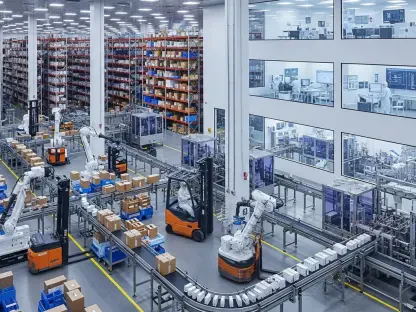Setting the Stage: A Supply Chain Talent Boom
The supply chain sector in 2025 stands at a crossroads of unprecedented demand, with global disruptions and technological leaps creating a perfect storm for talent acquisition. Recent data reveals a staggering 30% increase in job postings for specialized roles over the past year alone, as companies race to fortify their operations against volatility. This surge isn’t merely a reaction to immediate needs; it signals a profound shift in how businesses operate, driven by automation, sustainability mandates, and the relentless growth of e-commerce. This analysis aims to dissect the fastest-growing supply chain jobs, uncover the market forces propelling their rise, and project what lies ahead for this critical industry. By delving into current trends and salary benchmarks, the goal is to equip stakeholders with actionable insights into navigating this dynamic landscape.
Deep Dive into Market Trends and Projections
Technology’s Transformative Impact on Job Creation
The integration of cutting-edge technology is reshaping the supply chain job market at an extraordinary pace. Roles such as Digital Twin Engineer and AI/Machine Learning Operations Planner are witnessing explosive growth, with demand up by over 25% since last year, according to industry metrics. These positions, often commanding salaries between $110,000 and $190,000 annually, are pivotal in leveraging tools like artificial intelligence and virtual simulations to optimize operations. For instance, Digital Twin Engineers, earning an average of $139,000, develop digital replicas of supply chain systems to predict and mitigate inefficiencies. However, the rapid adoption of such technologies also presents hurdles, including high implementation costs and the need for seamless integration with existing frameworks, driving an urgent need for skilled professionals.
Beyond individual roles, the broader market trend points to a seismic shift toward automation. Warehouse Automation/Robotics Integration Leads are increasingly sought after to streamline distribution centers, reflecting a push to cut labor costs by up to 20% through robotic solutions. This technological pivot, while promising efficiency, raises concerns about workforce displacement and the need for retraining programs. Companies that fail to balance innovation with human capital risk falling behind, underscoring technology as both a driver and a challenge in this evolving sector.
Sustainability and Risk Mitigation as Core Priorities
Another defining trend in the supply chain job market is the heightened focus on sustainability and risk management, fueled by regulatory pressures and consumer expectations. Sustainability Analysts, with salaries ranging from $90,000 to $130,000, are in high demand to monitor carbon footprints and ensure compliance with stringent environmental standards. This role has seen a 15% uptick in openings over recent months, as businesses align with global green initiatives. Simultaneously, Supplier Risk & Resilience Managers, earning up to $157,000, are critical in safeguarding operations against geopolitical tensions and trade disruptions, a priority amplified by recent global uncertainties.
This dual emphasis reveals a market increasingly oriented toward long-term stability over short-term gains. Companies are investing heavily in talent to navigate complex environmental and risk landscapes, with projections suggesting a continued rise in demand for these roles through 2027. Yet, the challenge lies in balancing these imperatives with profitability, as overly aggressive risk mitigation can strain budgets. The market data indicates that firms prioritizing strategic hires in these areas are better positioned to build resilient and responsible supply chains.
Specialization and E-Commerce Fueling Role Evolution
The supply chain job market is also witnessing a transformation of traditional roles into highly specialized positions, driven by data analytics and the e-commerce boom. Supply Chain Planners and Engineers, now averaging salaries of $117,000, rely on sophisticated scenario modeling to manage inventory and design systems, a stark evolution from past manual processes. Concurrently, E-Commerce Fulfillment Managers are becoming indispensable as online retail dominates, tasked with mastering last-mile delivery under intense cost and time pressures. Transportation Network Strategists, with earnings between $110,000 and $150,000, further illustrate this trend by optimizing freight networks to address rising costs and sustainability goals.
Market analysis projects that e-commerce-related roles will grow by an additional 18% by 2027, reflecting the sector’s unyielding expansion. Specialization, however, demands a workforce adept in both operational and analytical skills, creating a competitive hiring environment. Businesses in urban markets face unique logistical challenges compared to rural regions, necessitating versatile talent capable of adapting strategies. This trend toward hybridization of skills is not just a passing phase but a structural shift in how supply chain roles are defined and valued.
Salary Trends and Competitive Talent Dynamics
A striking feature of the current market is the lucrative compensation tied to these high-growth roles, indicative of a tight labor pool and high stakes for businesses. Salaries frequently range from $100,000 to over $190,000 for senior positions, particularly in tech-driven roles like AI Operations Planners. This compensation trend highlights the premium placed on expertise in navigating complex, technology-centric environments while addressing sustainability and risk challenges. Industry forecasts suggest that salary growth will remain robust, with an expected annual increase of 5-7% for specialized roles through 2027, as companies vie for top talent.
The competitive dynamics extend beyond pay, with firms offering additional incentives such as training programs and flexible work arrangements to attract candidates. However, the market also faces a skills gap, with many organizations struggling to find professionals equipped for hybrid roles that blend technical and strategic capabilities. This imbalance between supply and demand for talent is likely to intensify, pushing businesses to invest in upskilling initiatives and partnerships with educational institutions to build a sustainable pipeline of qualified candidates.
Reflecting on Insights and Strategic Pathways
Looking back, this analysis paints a vivid picture of a supply chain job market in 2025 that is defined by rapid transformation and intense competition for talent. The surge in roles driven by technology, sustainability, and e-commerce underscores an industry adapting to modern complexities with remarkable agility. Key implications emerge for both professionals and businesses, highlighting the critical need to stay ahead of market shifts through strategic planning. For career seekers, the path forward involves prioritizing skills in data analytics, AI, and environmental compliance to tap into high-paying opportunities. Businesses, on the other hand, need to focus on identifying internal skill gaps and fostering talent development to maintain an operational edge. As the sector continues to evolve, proactive investment in both human capital and innovative tools stands out as the cornerstone for navigating future challenges and seizing emerging opportunities.









